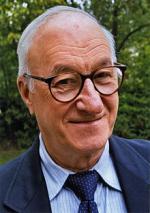Disable ads!
Albert Bandura
Albert Bandura OC (/bænˈdʊərə/; born December 4, 1925) is a psychologist who is the David Starr Jordan Professor Emeritus of Social Science in Psychology at Stanford University. For almost six decades, he has been responsible for contributions to many fields of psychology, including social cognitive theory, therapy and personality psychology, and was also influential in the transition between behaviorism and cognitive psychology. He is known as the originator of social learning theory and the theoretical construct of self-efficacy, and is also responsible for the influential 1961 Bobo doll experiment. Social learning theory is how people learn through observing others. An example of social learning theory would be the students imitating the teacher. Self-efficacy is "the belief in one’s capabilities to organize and execute the courses of action required to manage prospective situations." To paraphrase, self-efficiacy is believing in yourself to take action. The Bobo Doll Experiment was how Albert Bandura studied aggression and non-aggression in children. A 2002 survey ranked Bandura as the fourth most-frequently cited psychologist of all time, behind B. F. Skinner, Sigmund Freud, and Jean Piaget, and as the most cited living one. Bandura is widely described as the greatest living psychologist, and as one of the most influential psychologists of all time. In 1974 Bandura was elected to be the Eighty-Second President of the American Psychological Association (APA). He was one of the youngest president-elects in the history of the APA at the age of 46. Bandura served as a member of the APA Board of Scientific Affairs from 1968 to 1970 and is well known as a member of the editorial board of nine psychology journals including the Journal of Personality and Social Psychology from 1963 to 1972. At the age of 82, Bandura was awarded the Grawemeyer Award for psychology and is known as one of the most i Bandura was born in Mundare, in Alberta, a small town of roughly four hundred inhabitants, as the youngest child, and only son, in a family of six. The limitations of education in a remote town such as this caused Bandura to become independent and self-motivated in terms of learning, and these primarily developed traits proved very helpful in his lengthy career. Bandura is of Ukrainian and Polish descent. Bandura's parents were a key influence in encouraging him to seek ventures out of the small hamlet they resided in. The summer after finishing high school, Bandura worked in the Yukon to protect the Alaska Highway against sinking. Bandura later credited his work in the northern tundra as the origin of his interest in human psychopathology. It was in this experience in the Yukon, where he was exposed to a subculture of drinking and gambling, which helped broaden his perspective and scope of views on life. Bandura arrived in the US in 1949 and was naturalized in 1956. He married Virginia Varns (1921–2011) in 1952, and they raised two daughters, Carol and Mary.
 Read more on wikipedia.org Read more on wikipedia.org
 All quotes by Albert Bandura All quotes by Albert Bandura
 Edit Edit
|

|
|
|
|
|
Background photo by Giuliana
|